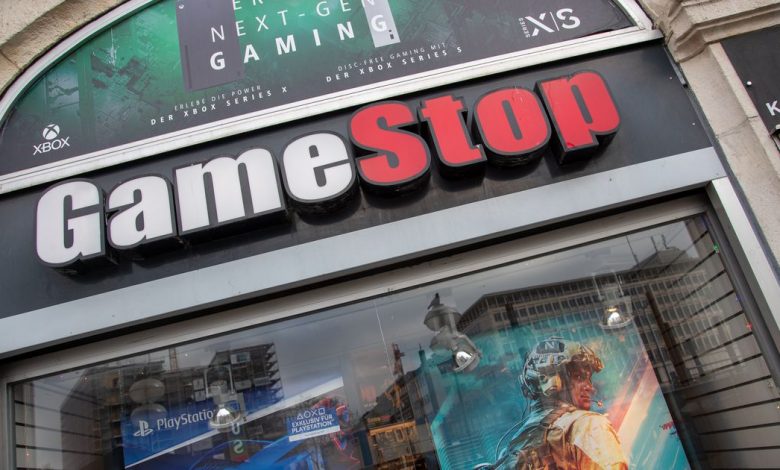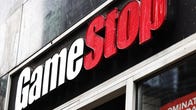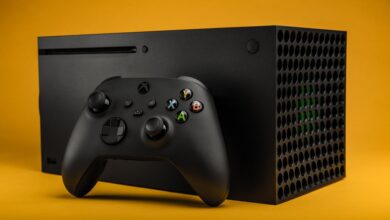GameStop: What happened after everyday stock traders rocked Wall Street

[ad_1]
It was a wild ride to the moon and back.
Getty Images
A year ago, GameStop commanded the attention of everyone. The struggling video game retailer’s shares soared to stratospheric heights, creating paper millionaires out of Redditors, costing hedge funds billions of dollars and prompting many people to wonder if a revolution was coming to the financial world.
That revolution never came. A year later, investment firms still control the ebb and flow of Wall Street, but they’re also more aware of how costly it can be when enough people bet against them.
The GameStop phenomenon, after all, succeeded in part because of a desire to stick it to the establishment, tapping into the collective anger – and savvy – of thousands of individual investors empowered by low-cost trading app Robinhood and organized on a subreddit called r/WallStreetBets. By driving up shares of GameStop, which hedge funds had bet would only fall, they enriched themselves while dealing a serious blow to Wall Street and raising questions.
This phenomenon is known as a short squeeze. And it worked spectacularly well.
GameStop’s stock price enjoyed gains through most of January 2021, but they exploded late in the month and peaked on Jan. 28, reaching a record high of $483. Shares of GameStop started the year at $19.
The rollercoaster ride, which saw Robinhood controversially shut down trading as GameStop’s stock price whipped back and forth, felt like it would permanently shake up the status quo.
Spoiler: It didn’t.
Here’s what’s really happened to some of the big players since then.
GameStop
Since January 2021, GameStop’s stock price has seesawed. As of the close bell Friday, the share price was at $98.50, which is still more than what financial analysts say the company is worth.
“The share price remains disconnected from the fundamentals,” said Wedbush analyst Michael Pachter. “They are still a destination for hardware and for physical software, but hardware supply constraints have limited their ability to thrive and the ongoing pandemic makes travel to the store more difficult or less convenient for many.”
Pachter added that GameStop sales haven’t grown as much as would be expected in a normal year following the launch of new consoles from Sony and Microsoft (both companies debuted new gaming gadgets in late 2020), and that’s due largely to low available inventory.
In the past year, GameStop has undergone some big changes, including a former Amazon executive taking over as CEO. Matt Furlong took the helm in June. Former CEO George Sherman stepped down with a reported $170 million windfall from his GameStop stocks.
The person who appears to be behind these moves is Ryan Cohen, co-founder of Chewy, a pet products e-tailer. Cohen bought 10% of GameStop in 2020 and became the chairman of the company’s board last year.
Earlier this month, GameStop revealed that it had been working on an NFT marketplace, which has yet to open. Non-fungible tokens are blockchain-created certificates of authenticity for a digital asset or piece of art. They’re also the latest craze in the cryptocurrency realm, with artists, celebrities, companies, athletes and more releasing these digital tokens, and some big money changing hands.
Robinhood
When the GameStop stock frenzy exploded, trading app Robinhood was at the center of the chaos. It was used so much that the company had to stop trading shares of GameStop in order to meet regulatory requirements.
On Jan. 28, when GameStop was hitting its peak, Robinhood advised its users that it would halt the buying of shares of the retailer. It cited the volatility of GameStop stock and of other companies as the reason for this unusual move. The step elicited an immediate backlash from Reddit investors.
Shortly after, Robinhood CEO Vlad Tenev said regulators required Robinhood to have a certain amount of cash on hand to cover all the trades happening for the day. This is a standard requirement. The amount Robinhood was quoted was far more than what the company had available, according to Tenev. So Robinhood made the unprecedented move of halting the buying of GameStop shares when they were at their peak.
Robinhood wasn’t the only company that had to make adjustments on Jan. 28. Banks like TD Ameritrade and other investing apps like WeBull limited certain trades involving GameStop.
In the aftermath, Congress held multiple hearings about the ordeal. When asked why his company wasn’t prepared for such volatility, Tenev said the GameStop situation was a “Black Swan event” and had a one in 3.5 million chance of happening. Robinhood came out relatively unscathed following the hearings, but it did have to pay a $70 million fine from the Financial Industry Regulatory Authority for misleading info and negligence.
Robinhood says it made changes to how it does business so customers won’t be surprised with trading restrictions again. This includes having $2.8 billion net capital, more than 21 times what the Securities and Exchange Commission requires, and having a larger customer support team.
Robinhood went public on July 26 with shares selling for $38. Though its stock price did rise in the months after, it’s since dropped and was at $12.55 when trading ended Friday.
Posters on WallStreetBets are still upset at Robinhood a year later. They continue to mock the company for its share prices dropping, with some even taking out short sell bets against the stock.
WallStreetBets
On its FAQ page, subreddit r/WallStreetBets describes itself as a “community for making money and being amused while doing it.” Users regularly roast themselves over their big stock market losses and their lack of knowledge. It was where an army of traders, willing to put their money down in hopes of striking it rich, came together to put the short squeeze on GameStop.
By the end of January 2021, the subreddit had just shy of 5 million subscribers – nearly triple the total from a month before – and jumped to more than 9 million in February, according to Subreddit Stats.
WallStreetBets currently has more than 11 million subscribers and is among the most popular subreddits on the site. GameStop is still one of the most talked-about stocks on the subreddit, but posters also discuss highly valued companies like Apple and Tesla, according to TopStonks, an analytics site created in 2020 as a tool for investors, which tracks what stocks WallStreetBets is talking about. Some smaller stocks that members are hoping to see shoot up in price include those of investment service SoFi, e-commerce site Wish, and social media app Nextdoor.
A moderator for WallStreetBets told The Wall Street Journal on Tuesday that there have been attempts to influence stock prices on the subreddit since its rise in popularity. The person said moderators “work pretty hard to keep that at bay.”
WallStreetBets also spawned similar subreddits, such as r/GME, named after the GameStop stock ticker name, and r/SuperStonk, which refers to the word “stonk” that was used in memes referencing the stock market.
Meme stocks
Though GameStop was the star of Wall Street for that short, early stretch, the long-term result of this phenomenon was the birth of a concept known as meme stocks.
Last year, WallStreetBets had its eye on several companies that appeared to be in the same spot as GameStop, with investment firms betting against them.
They consisted of Bed, Bath & Beyond, Nokia, Koss Headphones, Express, Naked Brand, Blackberry and AMC. Stock prices for all these companies jumped in late January along with GameStop’s, but they’ve since returned to where they were at the start of 2021, or they’ve dropped slightly, with the exception being AMC’s.
Unlike some of the other meme stock companies, AMC had its own roller-coaster ride. Its shares started 2021 at just over $2 apiece and rode GameStop’s coattails to bump up to $13 before dropping. At the end of May, the price went up again with the start of the summer blockbuster season and with AMC acknowledging individual traders by giving them free popcorn. AMC shares hit a high of $72 on June 2. They’ve since made their way down to about $15 when the markets closed on Friday.
AMC’s stock price surge in June showed that there’s still power in those everyday stock traders – if they work together. Whether they’ll work together again on another stock as they did with GameStop remains to be seen.
[ad_2]
Source link








